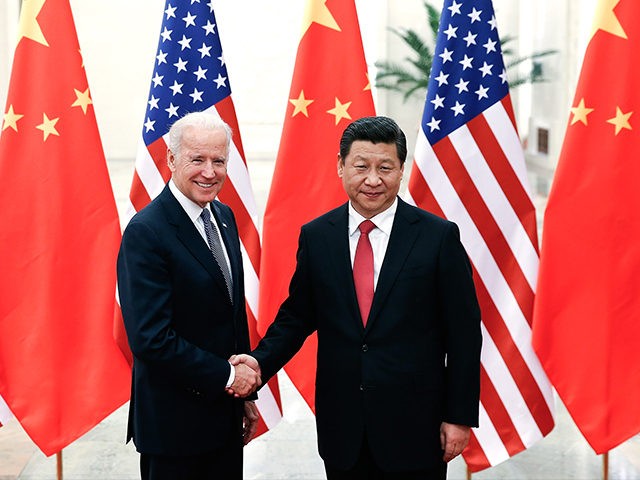Even before President Donald Trump has left office, Wall Street and Washington bureaucrats are moving to patch things up with China’s state enterprises.
The New York Stock Exchange has withdrawn plans to delist shares of three Chinese state-owned phone carriers. The shares were to be removed under an order from President Donald Trump, a move Beijing had warned might lead to retaliation.
The exchange cited “further consultation” with regulators but its announcement late Monday gave no other details. Many analysts think the move reflects the expectation of a softening of the stance of U.S. policy toward China when president-elect Joe Biden takes office.
“You’ve got to think it has more to do with who is going to be in office come January 20th,” CNBC anchor Becky Quick said on “Squawk Box” Tuesday.
“With Trump’s days in the White House coming to an end, the deep state panda huggers are feeling empowered once again,” said one former administration official.
China’s foreign ministry on Tuesday criticized Washington for “suppressing foreign companies” but made no direct comment on the NYSE announcement.
By subscribing, you agree to our terms of use & privacy policy. You will receive email marketing messages from Breitbart News Network to the email you provide. You may unsubscribe at any time.
The NYSE said Thursday it would remove China Telecom Corp. Ltd., China Mobile Ltd. and China Unicom Hong Kong Ltd. under Trump’s November order barring Americans from investing in securities issued by companies deemed to be linked to the Chinese military.
The order added to mounting U.S.-Chinese tension over technology, security, and spying accusations.
The Trump administration has imposed export controls and other sanctions on some Chinese companies, visa curbs on members of the ruling Communist Party and other restrictions.
“The suppression will have very limited impact on Chinese companies, but it will damage the national interest and image of the United States,” said a foreign ministry spokeswoman, Han Chunying. She expressed hope Washington will “do more to maintain the order of the global financial market” and protect investors.
While some political analysts say they expect little change in policy under Biden, many on Wall Street and in Beijing expect a warming of relations between with the U.S. and China despite widespread frustration with China’s trade and human rights records and accusations of spying and technology theft.
“Whatever the political analysts say, Wall Street thinks China is open for business again and the NYSE’s move is trumpet announcing it,” the former official said.
Trump’s November order bars Americans from investing in securities issued by companies deemed by the Defense Department to be part of efforts to modernize the Communist Party’s military wing, the People’s Liberation Army.
The 2 million-member PLA is one of the biggest and most heavily-armed militaries. It is spending heavily to develop nuclear submarines, stealth fighters, ballistic missiles, and other advanced weapons.
The Pentagon has added 35 companies to its blacklist. In addition to the phone carriers, they include telecom equipment giant Huawei, China’s biggest maker of processor chips, three state-owned oil producers and construction, aerospace, rocketry, shipbuilding, and nuclear power equipment companies.
Hong Kong-traded shares in the three phone carriers surged Tuesday. China Telecom rose 3.4%, China Mobile jumped 5.7% and China Unicom surged 8.5%. Shares in all three have fallen recently.
The Chinese government has accused Washington of misusing national security as an excuse to hamper competition and has warned that Trump’s order would hurt U.S. and other investors worldwide.
On Saturday, the foreign ministry said Beijing would take unspecified “necessary countermeasures” to protect its companies.
The government made the same announcement following previous U.S. sanctions without taking action.
–The Associated Press contributed to this report.

COMMENTS
Please let us know if you're having issues with commenting.